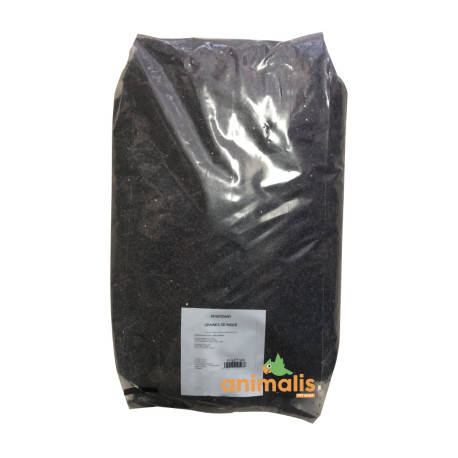





Reference: 103045150
Niger seed is a bird seed rich in phosphorus and calcium.
Niger seeds (or nyjer seeds) are fine seeds rich in oil.
They come from the Guizotia abyssinica (also known as Guizotia oleifera).
Niger is highly prized by most birds, with goldfinches and siskins being particularly fond of it.
Niger is one of the few bird seeds with a good calcium/phosphorus ratio.
Aleppo pine seeds (medium) for parakeets, parrots, crossbills... is a natural seed of the pine cone, a delight for your birds, this seed also has therapeutic properties, it can be added to the seed mix or in a separate feeder.
Flaxseed is rich in omega 3, which is essential for the cardiovascular system.
Millet is used in the diet of all birds: straight beaks and hooked beaks. In bunches, it's a treat they love.
Cluster millet has a good protein and carbohydrate content and also contains a large number of amino acids. Ideal for distracting your birds and thus avoiding pecking (feather pulling).
We advised giving red millet for exotic birds. It is richer in protein than yellow millet.
Carrot seeds are very rich in vitamins with a high proportion of vitamin A and carotene, as well as vitamin B, calcium and valuable carbohydrates.
Foniopaddy Seed is a natural grass seed grown on our plantations in Uganda. Scientific research has shown that Foniopaddy has a beneficial effect on coccidiosis.
Radish seeds have antioxidant, detoxifying, draining, and decongestant properties.
Cedar nuts contain approximately 55% of valuable unsaturated fatty acids, particularly linoleic and alpha-linolenic acid, as well as the rare pinoleic/pinolenic acid. They are rich in tocopherols (vitamin E) as antioxidants and high-quality proteins (approx. 17%). They also contain numerous minerals (including magnesium, potassium, phosphorus), trace elements (copper, manganese, zinc), vitamins (K and B), and flavonoids.
They have the property of binding to minerals such as calcium, iron and zinc and making them less bioavailable.
Improves liver and overall health of birds.
Suitable for a wide range of birds, including parrots, canaries, budgerigars, and other exotic birds.
Benefits for birds:
- Liver support.
- Detoxification: Helps eliminate toxins from the liver and improves digestion.
- Strengthening the immune system.
Instructions for use:
Dosage: Add a small amount (usually a teaspoon per day) to the birds' usual seeds. The amount may vary depending on the size and specific needs of the birds. Can be mixed with the birds' daily food.
Precautions:
Store in a cool, dry place, away from moisture and direct sunlight.
This seed from switchgrass is rich in protein (12.6%) it also contains 60% carbohydrates and less than 5% fat.
It is the richest variety of millet in protein. Japanese millet is recommended to all breeders of exotics, natives, parakeets, large parakeets.
Carrot seeds are very rich in vitamins with a high proportion of vitamin A and carotene, as well as vitamin B, calcium and valuable carbohydrates.
Buckwheat is a nutritious seed often included in the diet of cage and aviary birds.
- Appearance: Buckwheat is a triangular seed, light brown to greyish in colour, with a slightly rough shell.
Benefits for Birds:
- Balanced Nutrition: Buckwheat offers a combination of proteins, carbohydrates, and fibres, contributing to a balanced diet.
- Energy: The complex carbohydrates provide a sustainable source of energy for the birds' daily activities.
- Digestive System: The fibres promote good digestion and a healthy intestinal regulation.
- Proteins: The proteins in buckwheat support growth, reproduction, and the maintenance of muscle mass in birds.

